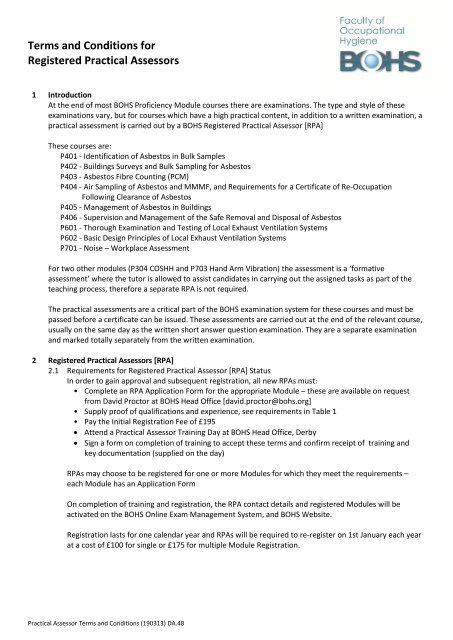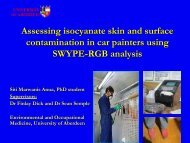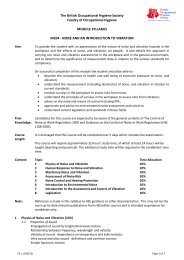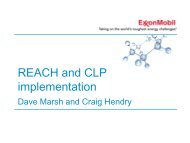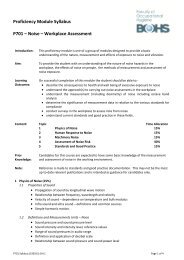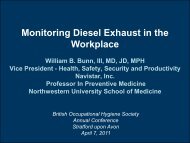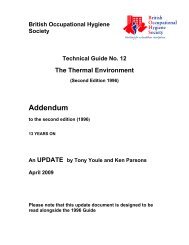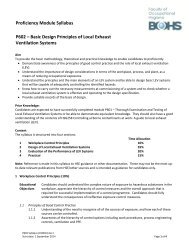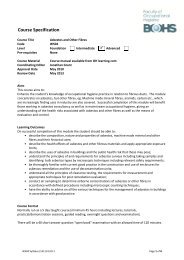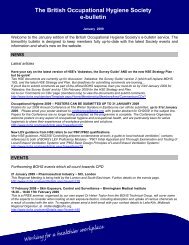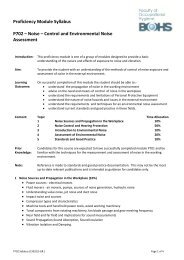Requirements for Conducting Practical Assessments - BOHS
Requirements for Conducting Practical Assessments - BOHS
Requirements for Conducting Practical Assessments - BOHS
- No tags were found...
Create successful ePaper yourself
Turn your PDF publications into a flip-book with our unique Google optimized e-Paper software.
Terms and Conditions <strong>for</strong>Registered <strong>Practical</strong> Assessors1 IntroductionAt the end of most <strong>BOHS</strong> Proficiency Module courses there are examinations. The type and style of theseexaminations vary, but <strong>for</strong> courses which have a high practical content, in addition to a written examination, apractical assessment is carried out by a <strong>BOHS</strong> Registered <strong>Practical</strong> Assessor [RPA]These courses are:P401 - Identification of Asbestos in Bulk SamplesP402 - Buildings Surveys and Bulk Sampling <strong>for</strong> AsbestosP403 - Asbestos Fibre Counting (PCM)P404 - Air Sampling of Asbestos and MMMF, and <strong>Requirements</strong> <strong>for</strong> a Certificate of Re-OccupationFollowing Clearance of AsbestosP405 - Management of Asbestos in BuildingsP406 - Supervision and Management of the Safe Removal and Disposal of AsbestosP601 - Thorough Examination and Testing of Local Exhaust Ventilation SystemsP602 - Basic Design Principles of Local Exhaust Ventilation SystemsP701 - Noise – Workplace AssessmentFor two other modules (P304 COSHH and P703 Hand Arm Vibration) the assessment is a ‘<strong>for</strong>mativeassessment’ where the tutor is allowed to assist candidates in carrying out the assigned tasks as part of theteaching process, there<strong>for</strong>e a separate RPA is not required.The practical assessments are a critical part of the <strong>BOHS</strong> examination system <strong>for</strong> these courses and must bepassed be<strong>for</strong>e a certificate can be issued. These assessments are carried out at the end of the relevant course,usually on the same day as the written short answer question examination. They are a separate examinationand marked totally separately from the written examination.2 Registered <strong>Practical</strong> Assessors [RPA]2.1 <strong>Requirements</strong> <strong>for</strong> Registered <strong>Practical</strong> Assessor [RPA] StatusIn order to gain approval and subsequent registration, all new RPAs must:• Complete an RPA Application Form <strong>for</strong> the appropriate Module – these are available on requestfrom David Proctor at <strong>BOHS</strong> Head Office [david.proctor@bohs.org]• Supply proof of qualifications and experience, see requirements in Table 1• Pay the Initial Registration Fee of £195 Attend a <strong>Practical</strong> Assessor Training Day at <strong>BOHS</strong> Head Office, Derby Sign a <strong>for</strong>m on completion of training to accept these terms and confirm receipt of training andkey documentation (supplied on the day)RPAs may choose to be registered <strong>for</strong> one or more Modules <strong>for</strong> which they meet the requirements –each Module has an Application FormOn completion of training and registration, the RPA contact details and registered Modules will beactivated on the <strong>BOHS</strong> Online Exam Management System, and <strong>BOHS</strong> Website.Registration lasts <strong>for</strong> one calendar year and RPAs will be required to re-register on 1st January each yearat a cost of £100 <strong>for</strong> single or £175 <strong>for</strong> multiple Module Registration.<strong>Practical</strong> Assessor Terms and Conditions (190313) DA.48
Table 1 RPA Qualifications/ExperienceModule No.P401P402P403P404P405P406P601P602P701Qualifications/ Experience Required P401 Proficiency Certificate or Certificate of Competence in Asbestos, and Two years’ experience of bulk analysis in a UKAS-registered laboratory, within the lastfive years. P402 Proficiency Certificate or Certificate of Competence in Asbestos, and Two years’ experience of asbestos survey and bulk sampling work with a UKASregisteredlaboratory within the last five years. P403 Proficiency Certificate or Certificate of Competence in Asbestos, and Two years’ experience of asbestos fibre counting in a UKAS-registered laboratorywithin the last five years. P404 Proficiency Certificate or Certificate of Competence in Asbestos, and Two years’ experience of asbestos air sampling and clearance work in a UKASregisteredlaboratory within the last five years. P405 Proficiency Certificate or Certificate of Competence in Asbestos, and Two years’ experience of asbestos management in buildings within the last five years. P406 Proficiency Certificate or Certificate of Competence in Asbestos, and Two years’ experience of supervision of safe removal and disposal of asbestos withinthe last five years. P601 Proficiency Certificate or Certificate of Operational Competence in OccupationalHygiene, or Diploma of Professional Competence in Occupational Hygiene, orequivalent ventilation engineering qualification, and Two years’ experience in the examination and testing of LEV systems within the lastfive years. P602 Proficiency Certificate or Certificate of Operational Competence in OccupationalHygiene, or Diploma of Professional Competence in Occupational Hygiene, orequivalent engineering qualification, and Two years’ experience in the design and evaluation of LEV systems within the last fiveyears. P701 Proficiency Certificate or Certificate of Operational Competence in OccupationalHygiene, or Diploma of Professional Competence in Occupational Hygiene, orequivalent Institute of Acoustics qualification, and Two years’ experience in the measurement and assessment of noise exposuremeasurement.2.2 RPAs must always behave in an appropriate and professional manner. They will be expected to attend atthe examination venue at the right time and conduct the practical assessment in an open and impartialmanner.2.3 RPAs will be expected to provide their own examination material and questions <strong>for</strong> all the candidates.The RPA will mark the candidates work using an appropriate marking schedule.2.4 An RPA will be removed from the published RPA list if they:• are found to be guilty of unethical and/or unprofessional behaviour• have received an unsatisfactory audit result following a written warning• have not carried out a practical assessment within an 18 month period• have not paid their annual re-registration feeAn Appeals Procedure (Document Reference DA.30) is available.3 The <strong>Practical</strong> AssessmentThe practical assessment, which is an examination, will normally be conducted by an RPA.The RPA must be independent of the Registered Course Provider [RCP]. Where exceptional circumstancesprevent this, the reasons must be advised to <strong>BOHS</strong> and a course of action authorised by the <strong>BOHS</strong> ChiefExaminer.<strong>Practical</strong> Assessor Terms and Conditions (190313) DA.48
For modules P601, P602 and P701 only, the RPA may be associated with the RCP but must still be an RPA andnot the course tutor.For the <strong>for</strong>mative practical assessment <strong>for</strong> P304 and P703 the practical assessment is carried out by thecourse tutor who does not need to be an RPA.The RPA must provide some elements of the assessment material as appropriate, [See Table 2].The RCP is responsible <strong>for</strong> providing all the applicable facilities, including all safety provisions, <strong>for</strong> the practicalassessment. The rooms and other locations in which the examination is conducted must be safe and suitable<strong>for</strong> purpose, and the RPA is required to confirm this be<strong>for</strong>e the practical assessment begins.During the practical assessment candidates may have access to any relevant reference material but not tocomputers, mobile phones or any other communications technology. Candidates must not be allowed tocommunicate with other candidates.RPAs can exclude candidates <strong>for</strong> disruptive or unsafe actions.The practical assessment examination comprises two or more elements. One of these will normally beconducted as a one-to-one with the RPA and will usually involve a practical exercise. The other elements mayinvolve inspections of facilities <strong>for</strong> faults and/or evaluation of situations as portrayed in photographs withquestions. Thus there is likely to be a considerable amount of written work during this assessment.The practical assessment will contain all the essential elements as detailed in the syllabus and this is definedin individual practical requirements documentation <strong>for</strong> each proficiency module.Table 2: Resources to be provided by RPAsAll Safety check lists <strong>for</strong> the facilitiesP304 Two appropriate case studies with supporting documentation, questions and relevantmarking scheduleP401 Check lists and marking schedules, including a sample handling log <strong>for</strong> evaluating thecandidates per<strong>for</strong>manceP402 Photographic set and questions, relevant marking schedules and samples and possiblyrelevant tools and RPE <strong>for</strong> candidates to use during the testing of taking samples andchecking their knowledge of asbestos typesP403 Checklists and marking schedules, including those <strong>for</strong> checking the microscopes, samplingand checking the candidates’ ability to do calculations. This must include a samplehandling logP404 Photographic set <strong>for</strong> testing the candidates knowledge along with the appropriatechecklists of faulting on enclosures and decontamination units Set of documents with questions to cover the other items required in the practicalassessment. [Four-stage clearance procedure, method statement etc.]P405 A set of photographs and documents along with relevant questions to cover all therequirements of the practical assessment. [Method statement, four-stage clearanceprocedure, conversion of survey into management plan etc.]P406 Photographs and other contents of the work-book with all the relevant marking schedulesto meet all the requirements of the assessment. The RCP is responsible <strong>for</strong> ensuring thatthere is a working decontamination unit available <strong>for</strong> this assessment along with anenclosure that can have faults implanted by the RPA<strong>Practical</strong> Assessor Terms and Conditions (190313) DA.48
P601 Test rigs, check lists and marking schedules. If it is proposed to use the test rig units asprovided by the RCP, there must be sufficient variation available on the rig to test thecandidates’ abilities. It is normal to use the measurement instruments as provided by theRCP, so that the candidates should already be familiar with them Photographic set of case studies with appropriate questions and relevant markingscheduleP602 Check lists and marking schedule. Fully detailed case studies with drawings,measurement data and photographs <strong>for</strong> which the candidates are required to provide asystem design. In addition case studies with drawings photographs <strong>for</strong> evaluation bycandidates.P701 Noise measurement equipment <strong>for</strong> carrying out noise assessments, Measurementequipment capable of octave band analysis. Measurement of personal exposure withpersona dosimetersP703 Suitable equipment to measure hand arm vibration exposure Suitable case studies to test candidates ability to carry out HAV risk assessmentsTo guarantee as far as possible that the timings are reasonable <strong>for</strong> the practical assessments, it will benecessary <strong>for</strong> the RCP(s) and RPA(s) to work together. The RCP must ensure that the equipment they provide,and the candidates, are ready at the stated time. The RPA must arrive on site in sufficient time to set up anyspecific provision that they require.In order to provide consistency RPAs and RCPs should use the timing and candidate numbers in Table 3 belowas guidance. Where there are more students than recommended, based on experience, it has been foundbetter to run two separate sessions sequentially rather than use a second practical assessor.In addition, it is strongly recommended that RCPs do not engage two RPAs to work on the same practicalassessment, because this leads to differences of approach, use of materials etc and provides possible grounds<strong>for</strong> discontent/challenge by candidates.Table 3: <strong>Practical</strong> Assessment Recommended Timings and Candidate NumbersCourse Maximum AssessmentdurationMaximum Number ofcandidates/assessorP401 4 hours 1 6P402 4 hours 8P403 4 hours 2 16P404 4 hours 8P405 4 hours 8P406 6 hours 6P601 6 hours 8P602 6 hours 8P701 6 hours 8Notes to Table 3:1 P401 – The limiting factor is the number of fume cabinets. The recommendations given in Table 3 arebased on the premise that the number of fume cabinets is the same as the number of candidates. Wherethe number of candidates exceeds the number of fume cabinets, this time will need to be extended,however, individual candidates should be restricted to a maximum of 4 hours to carry out the analysis onthe samples provided.2P403 – This timing assumes that all candidates have a microscope with which they are familiar. It isexpected that candidates will either bring their microscope with them or the RCP will ensure that thereare sufficient microscopes <strong>for</strong> all the candidates in one session. Individual candidates should be restrictedto a maximum of 4 hours to carry out the analysis on the slides provided.<strong>Practical</strong> Assessor Terms and Conditions (190313) DA.48
4 Marking and ResultsThe practical assessment will be marked by the RPA against a marking schedule.The pass marks <strong>for</strong> the practical assessments are set as follows: 70% <strong>for</strong>: P401, P403, P601, P602, P701 80% <strong>for</strong>: P402, P404, P405, P406The same pass mark must also apply to all sub-sections of the assessment.RPAs must report their results on the relevant candidate <strong>for</strong>ms which must be emailed to Melanie Chapman,[melanie.chapman@bohs.org] within 5 working days of the assessment.RPAs must not discuss the results of any assessment directly with candidates or the RCP and any such querymust be referred to the Examinations Department at <strong>BOHS</strong> Head Office. Where appropriate, <strong>BOHS</strong> willprovide candidate feedback after referring to the results <strong>for</strong>ms.RPAs must keep all documentation <strong>for</strong> each assessment <strong>for</strong> at least six months in case there are any appealsor other enquiries that require access to them.5 Quality AssuranceIn order to maintain standards the conduct of practical assessments is audited on a regular basis. There aresanctions that are applied <strong>for</strong> poor standards.6 Non-complianceWhere practical assessments are not conducted as per the above requirements or those specified in theindividual module requirements then a Non-compliance Report will be issued which will require the RPA totake corrective action. Failure to do so may result in the removal from the register of RPAs. An AppealsProcedure (Document Reference DA. 30) is available.<strong>Practical</strong> Assessor Terms and Conditions (190313) DA.48


